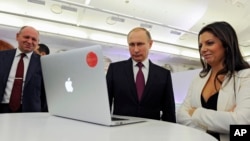On February 15, Russia’s RIA Novosti state news agency quoted retired U.S. Colonel Douglas Macgregor’s interview with the “Judge Napolitano - Judging Freedom” program, streamed on YouTube that same day.
The Russian translation of Macgregor’s claim isn’t precise but represents his ideas accurately:
"We just don't have ammunition to send. We have reached the limit; our own reserves are rapidly coming to an end."
This statement is misleading and fits into the Kremlin’s anti-U.S. and anti-Ukraine propaganda targeting Russia’s domestic audiences.
In reality, for most categories of ammunition, the U.S. can provide support to Ukraine indefinitely. Only for two types of ammunition -- 155 mm artillery ammunition, which includes a wide variety of non-precision projectiles, and 155 mm Excalibur GPS-guided precision artillery shells -- the United States may have a shortage in the coming years if it doesn’t replenish.
However, the U.S. has already moved to increase munitions production to avoid shortages. Another way to prevent ammunition shortages is to purchase it from third countries. The U.S. military has already purchased Soviet-standard 152 mm and 122 mm artillery shells and 125 mm tank shells outside the United States.
According to the Pentagon, “Since 2014, the United States has committed approximately $24 billion in security assistance to Ukraine and approximately $21.2 billion since the beginning of Russia's unprovoked, full-scale invasion on February 24.”
Russian use of Macgregor’s misinformation
On December 15, 2021, when the United States was warning about an imminent Russian invasion of Ukraine and the Kremlin was denying any such plans, RIA Novosti reported it was unlikely that the Ukrainian army could withstand a Russian military invasion for more than three to four days. The agency quoted an article in The National Interest written by Macgregor and former CIA officer George Beebe:
“Under these circumstances, it is not unreasonable to assume that Russian ground forces would reach their operational objectives along the Dnieper River in as little as seventy-two to ninety-six hours.”
However, the Russian troops were unable to reach their goals in the Dnipro River basin even by mid-March 2022.
As of January 2, 2023, Ukraine had liberated 40% of the territory that Russian forces occupied after last year's invasion.
RIA Novosti quoted Macgregor again on March 6 as telling Fox Business that the Russian army in Ukraine was being very careful to protect civilians:
“The colonel noted that the Russian side is trying to act as carefully as possible and minimize damage, unlike, in particular, the US army in Iraq. He also expressed the opinion that the defeat of the Armed Forces of Ukraine is inevitable, and President Zelensky is trying to delay it by any means.”
That claim was also false. Ukrainian and international authorities, including the United Nations, reported mass atrocities against Ukrainian civilians allegedly committed by the Russian troops, some of which potentially constitute war crimes.
Amnesty International, a London-based human rights group, reported on February 25, 2022, that the Russian army had carried out indiscriminate missile and bomb strikes on civilian targets in Ukraine. In just the first five days of the war, at least 102 Ukrainian civilians were killed (including seven children) and 304 injured, according to the United Nations.
On March 25, 2022, RIA Novosti quoted Macgregor as falsely claiming in an interview with the “Judge Napolitano - Judging Freedom” YouTube show that a majority of the residents of eastern Ukraine were Russians. Calling the Russia-occupied regions of eastern Ukraine “these republics,” in language used by the Kremlin’s disinformation campaign, Macgregor said:
“These republics are fundamentally pro-Russian. And, in general, mostly Russians live in eastern Ukraine. … They should not be forced to speak Ukrainian, write Ukrainian, they are not Ukrainians.”
But the 2001 census, the last before Russia’s 2014 annexation of Crimea, showed that most of eastern Ukraine residents are ethnic Ukrainians, with ethnic Russians the region’s largest minority.
The Voice of America asked the U.S. Department of Defense (DOD) to comment on Russia’s use of Macgregor’s erroneous forecasts and analysis in its domestic disinformation.
“Douglas Macgregor is a private citizen, exercising his 1st Amendment rights as an American, and so his views are his own and not representative of official U.S. or DOD policy,” DOD spokesman Lt. Col. Garron Garn said.
Macgregor did not answer Polygraph.info’s inquiry.





